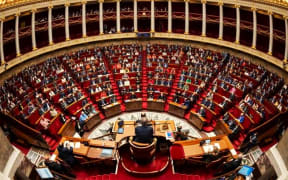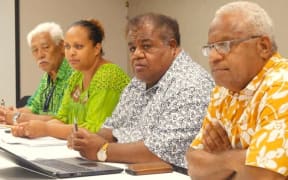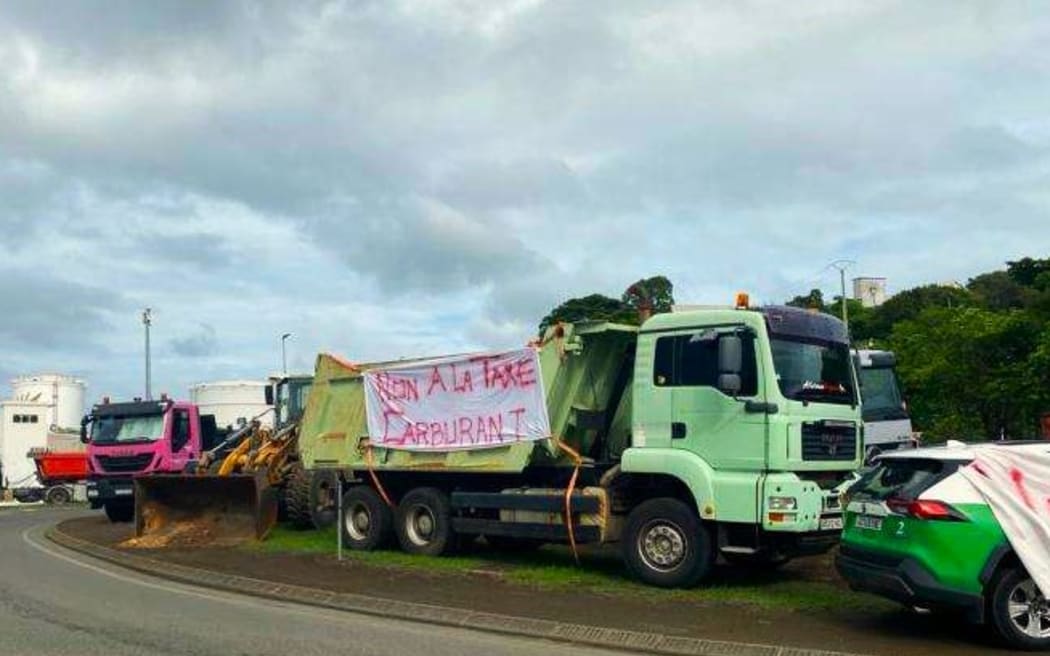
Trucks, taxis blockading the entrance to the main fuel depot in Ducos, Nouméa industrial zone. Photo: LNC
Analysis - A combination of inter-twined economic, political and socially pressing issues are taking their toll in New Caledonia.
The spiral is threatening to plunge the French Pacific archipelago into ongoing instability, with contributing factors being a grave crisis in the nickel industry, its widespread economic and social trickle-down effect, all combined with a loaded political agenda in the French Parliament aimed at modifying New Caledonia's status within the French Republic.
At the weekend, all those issues were part of the agenda for the pro-independence front, the FLNKS, which has held a crucial annual (and 42nd) Congress in the small town of Dumbéa, in the suburbs of the capital Nouméa.
Speaking on behalf of FLNKS, Pascal Sawa told local media on Sunday all of the urgent matters were on the Congress's agenda.
But the political issues regarding New Caledonia's future and electoral roll came out clearly at the top.
Despite recent and ongoing differences within its component parties, the pro-independence movement decided to formally call on the French government to withdraw its plan to modify the French Constitution in order to change the conditions of eligibility for citizens to be allowed to vote at local elections.
The plan, promoted by French Home Affairs and Overseas Minister Gérald Darmanin, is to be discussed this week in the French Senate, as part of its parliamentary process.
The process to "unfreeze" New Caledonia's electoral roll will also involve debates in the French Lower House (the National Assembly) and in the French Congress (a gathering of both French Houses of Parliament) which has to endorse the Constitutional amendment by a majority of three fifths.
It aims at allowing French citizens, indigenous Kanaks and non-Kanaks, to vote at local provincial elections provided they have been residing in New Caledonia for at least 10 uninterrupted years.
The current rule, introduced by the Nouméa Accord (signed in 1998), only allowed people to vote if they had been residing in New Caledonia before 1998.
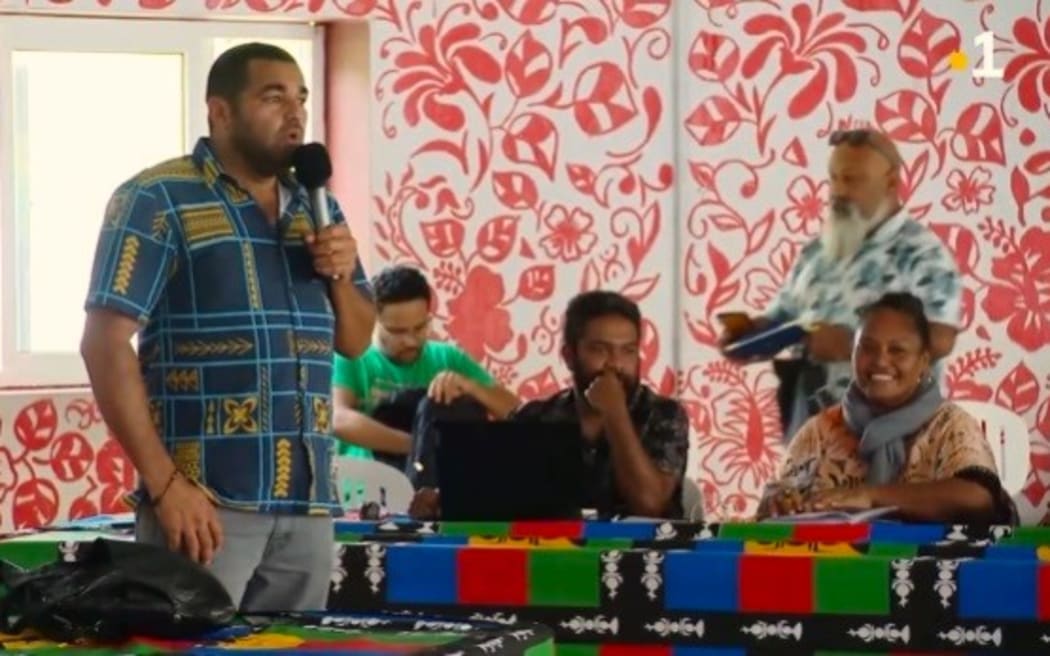
FLNKS Congress in Dumbéa, near Nouméa 23 March 2024. Photo: NC la Première
Calls for a "dialogue mission"
Accusing the French State of "forcing its way" and of "becoming partial", Sawa said the FLNKS was now asking that this amendment be withdrawn and that a French "dialogue mission" (similar to the delegations sent by Paris before the signing of the 1998 Nouméa Accord), headed by a "high, recognised and independent official" should come to New Caledonia.
He however admitted that within the FLNKS (which consists of Union Calédonienne (UC), Kanak Liberation Party (PALIKA), Rassemblement Démocratique Océanien (RDO) and Union des Partis Mélanésiens (UPM), parties still had "disagreements" on the electoral roll issue.
One of these components, the PALIKA, is in favour of a moderate approach and would be ready to accept the threshold of 10 years as a minimum residency requirement and as part of what is described as a "sliding" electoral roll (as opposed to the current "frozen" one).
Other FLNKS members, like the UC, clearly disagree as they fear this would place indigenous Kanaks in a minority position.
"This would bring us back 40 years in time", Sawa said, adding that the change would have a big impact as it would "bring unbalance to New Caledonia's whole electoral structure".
On many occasions, Darmanin has motivated the change in electoral rules by saying in substance that the temporary restrictions prescribed by the 1998 Nouméa Accord, over 25 years later, could not be sustained forever as they were preventing a whole new generation of citizens to vote in their home country and could therefore be considered a denial of democracy on French soil.
But at the weekend, the FLNKS at least managed to gather consensus on the movement requesting France to withdraw its text.
Intertwined with the controversial Constitutional amendment project is a French-perceived need for all political players in New Caledonia to produce a consensual, bipartisan draft in order to replace the Nouméa Accord.
But some parties, on both sides of the political spectrum (pro-France and pro-independence), have yet to agree to sit at the same table under the "inclusive" format.
According to the Paris plan, those "inclusive" political discussions (which are currently at a standstill), if they produced a new locally-produced text before 1 July 2024, would be immediately taken into account and replace the current Constitutional amendment draft.
Last week, the French Parliament already endorsed an "organic law" which postpones New Caledonia's provincial elections from mid-May (as originally scheduled) to "15 December at the latest".
Last week also, a group of Senators visited New Caledonia.
Back in Paris, they have hinted that this week, during Senate debates on the draft, they would recommend that the series of deadlines and dates it contains should be relaxed or even removed altogether to "ease the pressure" on local politicians.
From the FLNKS point of view, Sawa said, "dialogue, a consensual solution and a comprehensive agreement" are still feasible".
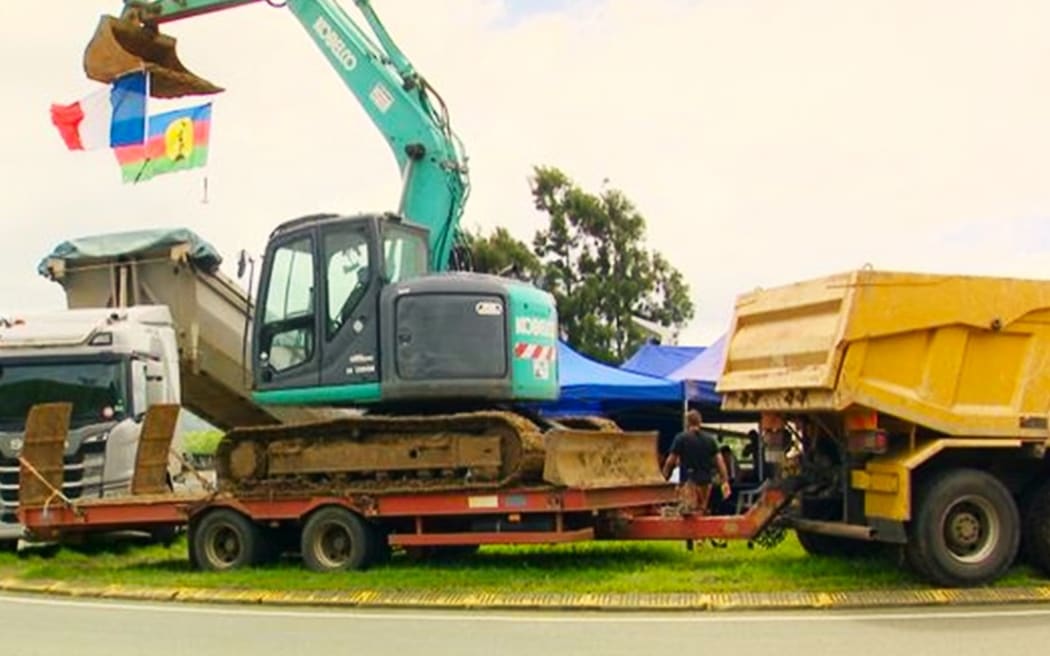
Trucks and caterpillars barring access to service stations in Nouméa on 23 March 2024. Photo: NC la Première
'Nickel pact' still not signed
Other major issues currently affecting New Caledonia were the impact of a global crisis in the nickel industry, which is currently the main pillar of New Caledonia's economy.
Faced with increasing competition from emerging world producers such as Indonesia and China (which are now producing much cheaper nickel), New Caledonia, once a major producer, has found itself gravely hit... and sidelined.
A few weeks ago, one of the three major processing plants, Koniambo (KNS), in the north of the main island, was placed in sleep, non-productive mode due to a decision by its major financier, Anglo-Swiss giant, Glencore.
Glencore is now seeking a potential buyer for its 49 percent shareholding.
In the South, the other two nickel plants, Prony Resources and Société le Nickel (SLN, a subsidiary of French mining giant Eramet), are also facing similar hardships.
The French government and its Finance minister Bruno Le Maire, who visited New Caledonia in November 2023, are demanding that a "nickel pact" be signed by all local players (political, economic).
The plan (which involves French financial assistance to the tune of at least 200 million Euros) would however be tied to far-reaching reforms in order to make New Caledonia's nickel competitive and attractive again under the current world market conditions.
The plan's signing was scheduled to take place on 25 March.
But this has not happened yet.
New Caledonia's pro-independence President, Louis Mapou, has since refused to sign the document until he obtains an official mandate from New Caledonia's Congress (the local Parliament), which is now scheduled to meet on the issue on Thursday 28 March.
Mapou also underlined that the French nickel pact, in its current version, does not meet the level of expectations from New Caledonia.
On that issue, the FLNKS said it would not take any stand and would leave it to the Congress.
The French plan also came under open criticism last week from a moderate, pro-France party, the Avenir Ensemble (AE). Amongst other things, AE leader Philippe Gomès said it would undermine New Caledonia's mining sovereignty.
In New Caledonia, the nickel industry until recently employed about a quarter of the total workforce.
The current situation has already destroyed hundreds of local jobs and is threatening to put thousands at short-term risk.
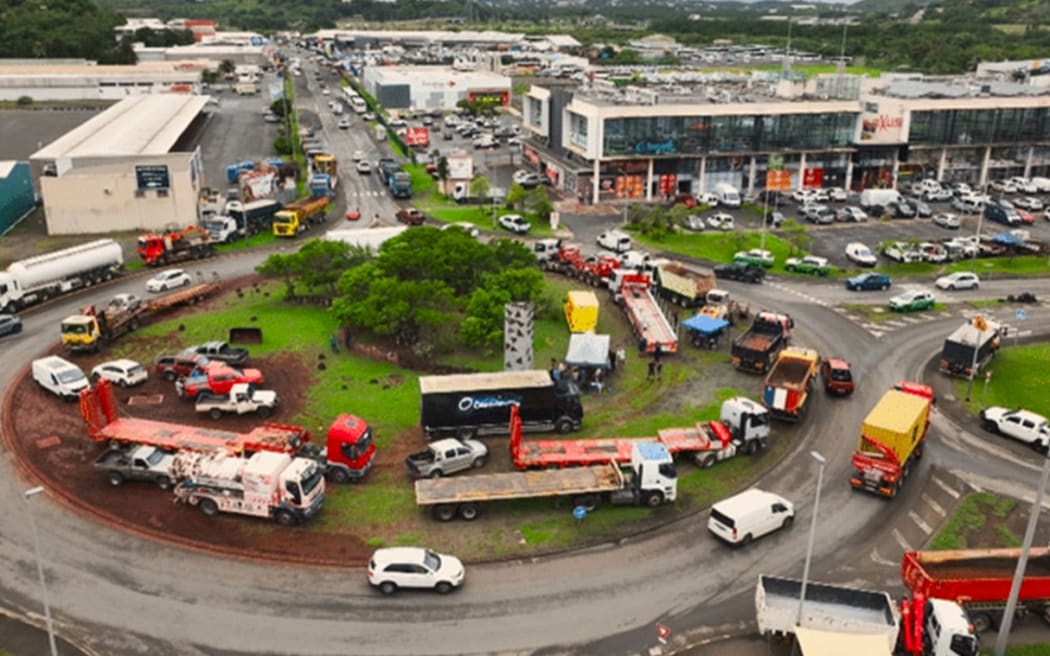
Trucks blockading the roundabout leading to the main fuel depot in Ducos, Nouméa industrial zone. Photo: NC la Première
Walkout, growing tensions within the local government
In the face of the current economic crisis, a project from the majority of pro-independence parties to introduce more taxes (including on the consumption of electricity, to help local company Enercal absorb huge losses), four pro-France parties last week walked out of Congress debates, saying their views were not taken into account and that Mapou's government (which they are part of) was "anti-democratic".
The four de facto ministers (Isabelle Champmoreau, Christopher Gygès, Thierry Santa and Yoann Lecourieux) are from pro-France Les Loyalistes and Rassemblement parties.
On Monday, they told media that the latest straw was that Mapou did not consult them about holding a press conference he held that same day.
The four later said they did not regard the current government as "legitimate" and that they now considered themselves part of "opposition".
Congress speaker, pro-independence veteran Roch Wamytan, has since urged them to "come back".
"Your place is here, not outside", he said.
Mapou, on Monday, told local media the four dissidents had other legitimate means to challenge the government, like "resigning or a motion of non-confidence".
The blockades, led by a so-called "Agissons Solidaires" (AS, "Let's Act in Solidarity"), aimed at protesting against another tax project, this time on fuel.
They materialised by all of New Caledonia's fuel depots becoming inaccessible and later all of New Caledonia's service stations facing fuel shortage since.
As an emergency measure, the French High commission established a list of 16 "requisitioned" fuel stations, allowing for essential services providers to be able to fill up their vehicles.
Mapou said on Monday some of the Congress tax debates including the controversial fuel tax, would be postponed (but not withdrawn) to June this year
Agissons Solidaires wants a moratorium on all of New Caledonia government's new tax projects and on Monday said they intended to carry on with their movement until all tax projects are withdrawn.
During his press conference on Monday, Mapou also called on "everyone to stay on the same boat".
"We really have to stop throwing insults at each other, because with a small population like ours, full of divisions caused by History, there is a risk that some fires could be quickly re-ignited", he cautioned.
